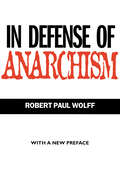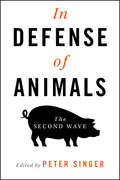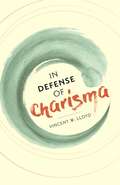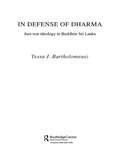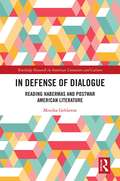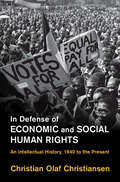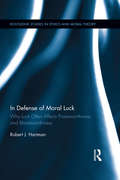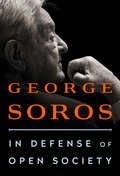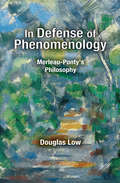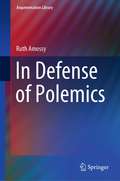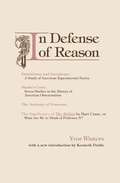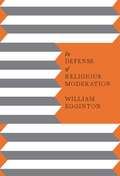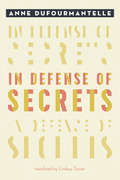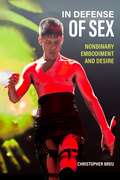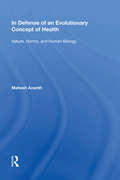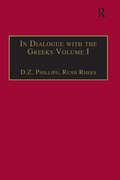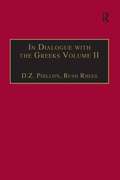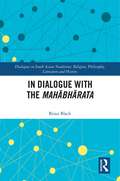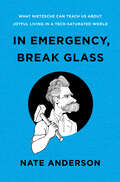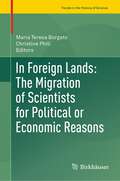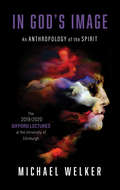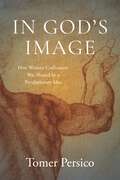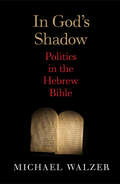- Table View
- List View
In Defense of Anarchism
by Robert Paul WolffIn Defense of Anarchism is a 1970 book by the philosopher Robert Paul Wolff, in which the author defends individualist anarchism. He argues that individual autonomy and state authority are mutually exclusive and that, as individual autonomy is inalienable, the moral legitimacy of the state collapses.
In Defense of Animals
by Peter SingerBringing together new essays by philosophers and activists, In Defense of Animals: The Second Wave highlights the new challenges facing the animal rights movement. Exciting new collection edited by controversial philosopher Peter Singer, who made animal rights into an international concern when he first published In Defence of Animals and Animal Liberation over thirty years ago Essays explore new ways of measuring animal suffering, reassess the question of personhood, and draw highlight tales of effective advocacy Lays out "Ten Tips for Activists", taking the reader beyond ethical theory and into the day-to-day campaigns for animal rights
In Defense of Charisma
by Vincent W. LloydMartin Luther King, Jr., has charisma—as does Adolf Hitler. So do Brad Pitt, Mother Teresa, and many a high school teacher. Charisma marks, or masks, power; it legitimates but also attracts suspicion. Sociologists often view charisma as an irrational, unstable source of authority, superseded by the rational, bureaucratic legitimacy of modernity. Yet charisma endures in the modern world; perhaps it is reinvigorated in the postmodern, as the notoriety of celebrities, politicians, and New Age gurus attests. Is charisma a tool of oppression, or can it help the fight against oppression? Can reexamining the concept of charisma teach us anything useful about contemporary movements for social justice?In Defense of Charisma develops an account of moral charisma that weaves insights from politics, ethics, and religion together with reflections on contemporary culture. Vincent W. Lloyd distinguishes between authoritarian charisma, which furthers the interests of the powerful, naturalizing racism, patriarchy, and elitism, and democratic charisma, which prompts observers to ask new questions and discover new possibilities. At its best, charisma can challenge the way we see ourselves and our world, priming us to struggle for justice. Exploring the biblical Moses alongside Charlton Heston’s performance in The Ten Commandments, the image of Martin Luther King, Jr., together with tweets from the Black Lives Matter movement, and the novels of Harper Lee and Sherman Alexie juxtaposed with the writings of Emmanuel Levinas, In Defense of Charisma challenges readers to turn away from the blinding charisma of celebrities toward the humbler moral charisma of the neighbor, colleague, or relative.
In Defense of Dharma: Just-War Ideology in Buddhist Sri Lanka (Routledge Critical Studies in Buddhism #Vol. 24)
by Tessa J. BartholomeuszThis is the first book to examine war and violence in Sri Lanka through the lens of cross-cultural studies on just-war tradition and theory. In a study that is textual, historical and anthropological, it is argued that the ongoing Sinhala-Tamil conflict is in actual practice often justified by a resort to religious stories that allow for war when Buddhism is in peril. Though Buddhism is commonly assumed to be a religion that never allows for war, this study suggests otherwise, thereby bringing Buddhism into the ethical dialogue on religion and war. Without a realistic consideration of just-war thinking in contemporary Sri Lanka, it will remain impossible to understand the power of religion there to create both peace and war.
In Defense of Dialogue: Reading Habermas and Postwar American Literature (Routledge Research in American Literature and Culture)
by Monika GehlawatIn Defense of Dialogue: Reading Habermas and Postwar American Literature offers a timely investigation of the value of dialogue in contemporary American culture. Using Jürgen Habermas’s theory of communicative action to read the work of Frank O’Hara, James Baldwin, Grace Paley, and Andy Warhol, In Defense of Dialogue assembles postwar writers who have never been studied alongside one another, showing how they overcame the pervading skepticism of their contemporaries to imagine sincere and rational speakers who seek to cultivate intersubjective discourse.
In Defense of Economic and Social Human Rights: An Intellectual History, 1940 to the Present (Human Rights in History)
by Christian Olaf ChristiansenBreaking new ground in the intellectual history of economic and social human rights, Christian Olaf Christiansen traces their justification from the outset of World War II until the present day. Featuring a series of fascinating thinkers, from political scientists to Popes, this is the first book to comprehensively map the key arguments made in defense of human rights and how they connect to ideas of social and redistributive justice. Christiansen traces this intellectual history from a first phase devoted to internationalizing these rights, a second phase of their unprecedented legitimacy deployed to criticize global inequality, to a third phase of a continued quest to secure their legitimacy once and for all. Engaging with the newest scholarship and building a bridge to political philosophy as well as global inequality studies, it facilitates a much-needed novel and nuanced history of rights-rights we should still consider defending today.
In Defense of Lost Causes
by Slavoj ZizekIn this combative major new work, philosophical sharpshooter Slavoj i ek looks for the kernel of truth in the totalitarian politics of the past.Examining Heidegger's seduction by fascism and Foucault's flirtation with the Iranian Revolution, he suggests that these were the 'right steps in the wrong direction.' On the revolutionary terror of Robespierre, Mao and the bolsheviks, i ek argues that while these struggles ended in historic failure and horror, there was a valuable core of idealism lost beneath the bloodshed.A redemptive vision has been obscured by the soft, decentralized politics of the liberal-democratic consensus. Faced with the coming ecological crisis, i ekk argues the case for revolutionary terror and the dictatorship of the proletariat. A return to past ideals is needed despite the risks. In the words of Samuel Beckett: 'Try again. Fail again. Fail better.'
In Defense of Love
by Ron Rosenbaum"Rosenbaum offers a spirited and enjoyable defense of his version of love." —The Wall Street JournalA stirring manifesto on love in the modern age, now available for the first time in paperback: . . .In a work of ambition and brio, legendary journalist Ron Rosenbaum tackles his hardest topic yet: everyone's favorite four-letter word. He begins by investigating the neuroscience of love, arguing that our understanding of love is imperiled by quantification and algorithms, which distill our behavior into mathematical formulas, our personality into brain-chemical categories, and our curiosity into quiz questions. The very capacity that makes us human, Rosenbaum posits, is being taken over by numbers.To save it, he turns to literature and pop culture, discussing writing about love from a vast range of sources, including Tolstoy novellas, trailblazing Updike manuscripts, David Foster Wallace and Chrissie Hynde. Part of love&’s essence is its mystery, says Rosenbaum, and when he eventually finds his own answer to the riddle of love — a happy ending! — it turns up in a completely unexpected place.In Defense of Love is more than an examination of the intersection of love with literature and science. It is a celebration of the uncanny and the persistent, the sublime and the ridiculous: the inexorable power of love.
In Defense of Moral Luck: Why Luck Often Affects Praiseworthiness and Blameworthiness (Routledge Studies in Ethics and Moral Theory)
by Robert J. HartmanThe problem of moral luck is that there is a contradiction in our common sense ideas about moral responsibility. In one strand of our thinking, we believe that a person can become more blameworthy by luck. For example, two reckless drivers manage their vehicles in the same way, and one but not the other kills a pedestrian. We blame the killer driver more than the merely reckless driver, because we believe that the killer driver is more blameworthy. Nevertheless, this idea contradicts another feature of our thinking captured in this moral principle: A person’s blameworthiness cannot be affected by that which is not within her control. Thus, our ordinary thinking about moral responsibility implies that the drivers are and are not equally blameworthy. In Defense of Moral Luck aims to make progress in resolving this contradiction. Hartman defends the claim that certain kinds of luck in results, circumstance, and character can partially determine the degree of a person’s blameworthiness. He also explains why there is a puzzle in our thinking about moral responsibility in the first place if luck often affects a person’s praiseworthiness and blameworthiness. Furthermore, the book’s methodology provides a unique way to advance the moral luck debate with arguments from diverse areas in philosophy that do not bottom out in standard pro-moral luck intuitions.
In Defense of Open Society
by George SorosAn impassioned defense of open society, academic and media freedom, and human rights.George Soros -- universally known for his philanthropy, progressive politics, and investment success--has been under sustained attack from the far right, nationalists, and anti-Semites in the United States and around the world because of his commitment to open society and liberal democracy.In this brilliant and spirited book, Soros brings together a vital collection of his writings, some never previously published. They deal with a wide range of important and timely topics: the dangers that the instruments of control produced by artificial intelligence and machine learning pose to open societies; what Soros calls his "political philanthropy"; his founding of the Central European University, one of the world's foremost defender of academic freedom; his philosophy; his boom/bust theory of financial markets and its policy implications; and what he calls the tragedy of the European Union. Soros's forceful affirmation of freedom, democracy, the rule of law, human rights, social justice, and social responsibility as a universal idea is a clarion call-to-arms for the ideals of open society.
In Defense of Phenomenology: Merleau-Pontys Philosophy
by Douglas LowFrench phenomenological philosopher Maurice Merleau-Ponty argued for the primary role perception plays in understanding the world as well as engaging with it. As a contributor to phenomenology, Merleau-Ponty faced his fair share of criticisms. In this new book, Douglas Low comes to the defence of both Merleau-Ponty and phenomenology.In Defence of Phenomenology uses Merleau-Ponty's philosophy to counter the criticisms raised in Vincent Descombes's Modern French Philosophy point by point, arguing that it often misunderstood or misrepresented Merleau-Ponty's philosophy. Low clarifies Merleau-Ponty's claims, then makes the case for them. He also argues against Renaud Barbaras's well-known positions that there is a break in the development of Merleau-Ponty's thought, that Merleau-Ponty abandoned his earlier phenomenology, and that Merleau-Ponty equated being with phenomena. Low also clarifies Merleau-Ponty's complex relationship to Hegel and Marx. Finally, Low addresses the later works of Jean Baudrillard and their move away from phenomenology toward a more postmodernist philosophy, in which language and mass media images dominate culture and even construct our worldview.In Defence of Phenomenology asserts that Merleau-Ponty more sensibly argued that even though humanity's interpretation of the world is influenced by language and the media, these linguistic and media messages are first suggested by a person's needful, embodied encounters with the world and with others. These messages would make little sense if they did not relate back to this more primordial encounter.
In Defense of Polemics (Argumentation Library #42)
by Ruth AmossyThis book revisits the definition of polemical discourse and deals with its functions in the democratic sphere. It first examines theoretical questions concerning the management of disagreement in democracy and the nature of polemical discourse. Next, it analyses case studies involving such issues as the place of women in the public space, illustrated by the case of the burqa in France and public controversy in the media on the exclusion of women from the public space. The book then explores reason, passion and violence in polemical discourse by means of cases involving confrontations between secular and ultra-orthodox circles, controversies about the Mexican Wall and fierce discussions about stock-options, and bonuses in times of financial crisis.Although polemical exchanges in the public sphere exacerbate dissent instead of resolving conflicts, they are quite frequent in the media and on the Net. How can we explain such a paradox? Most studies in argumentation avoid the question: they mainly focus on the verbal procedures leading to agreement. This focus stems from the centrality conferred upon consensus in our democratic societies, where decisions should be the result of a process of deliberation. What is then the social function of a confrontational management of dissent that does not primarily seek to achieve agreement? Is it just a sign of decadence, failure and powerlessness, or does it play a constructive role? This book answers these questions.
In Defense of Reason
by Yvor Winters Kenneth FieldsYvor Winters has here collected, with an introduction, the major critical works—Primitivism and Decadence, Maule's Curse, and The Anatomy of Nonsense—of the period in which he worked out his famous and influential critical position. The works together show an integrated position which illuminates the force and importance of the individual essays. With The Function of Criticism, a subsequent collection, In Defense of Reason provides an incomparable body of critical writing. <P><P> The noted critic bases his analysis upon a belief in the existence of absolute truths and values, in the ethical judgment of literature, and in an insistence that it is the duty of the writer—as it is of very man—to approximate these truths insofar as human fallibility permits. His argument is by theory, but also by definite example—the technique of the “whole critic” who effectively combines close study of specific literary works and a penetrating investigation of aesthetic philosophies.
In Defense of Religious Moderation
by William EggintonIn his latest book, William Egginton laments the current debate over religion in America, in which religious fundamentalists have set the tone of political discourse—no one can get elected without advertising a personal relation to God, for example—and prominent atheists treat religious belief as the root of all evil. Neither of these positions, Egginton argues, adequately represents the attitudes of a majority of Americans who, while identifying as Christians, Jews, and Muslims, do not find fault with those who support different faiths and philosophies. In fact, Egginton goes so far as to question whether fundamentalists and atheists truly oppose each other, united as they are in their commitment to a "code of codes." In his view, being a religious fundamentalist does not require adhering to a particular religious creed. Fundamentalists—and stringent atheists—unconsciously believe that the methods we use to understand the world are all versions of an underlying master code. This code of codes represents an ultimate truth, explaining everything. Surprisingly, perhaps the most effective weapon against such thinking is religious moderation, a way of believing that questions the very possibility of a code of codes as the source of all human knowledge. The moderately religious, with their inherent skepticism toward a master code, are best suited to protect science, politics, and other diverse strains of knowledge from fundamentalist attack, and to promote a worldview based on the compatibility between religious faith and scientific method.
In Defense of Secrets
by Anne DufourmantelleIn an age that prizes political and personal transparency, In Defense of the Secret champions the secret as what permits relation and ensures our humanity.Psychoanalyst and philosopher Anne Dufourmantelle drowned in 2017 in an attempt to rescue two children caught in the ocean. Her work lives on, though, in this provocative and necessary book. Through etymologies and case studies, personal history and incisive commentary on contemporary society, In Defense of Secrets returns us to the fundamental psychic scene of the secret. The secret, for Dufourmantelle, is not a code to be cracked or a firewall to be penetrated but a dynamic and powerful entity that permits relation and that ensures our humanity.Tracking the secret though art and literature, philosophy, psychoanalysis, and sociology, from the Inquisition to the present, Dufourmantelle’s writing spirals around the question of the secret’s value. In our age, when political and personal transparency seem to be prized above all—lives posted on the Internet, information leaked, whistles blown, taboos absent except with respect to the secret itself—In Defense of Secrets champions what remains hidden, private, veiled, hushed, just out of sight. The secret is on the side of nature, not science; organic growth, not technology; love’s generosity, not knowledge’s grasp. For Dufourmantelle, the secret is a powerful and dynamic thing: deadly if unheard or misused, perhaps, but equally the source of creativity and of ethics. An ethics of the secret, we can hear her say, means listening hard and sensitively, respecting the secret in its secret essence, unafraid of it and open to what it has to say.
In Defense of Sex: Nonbinary Embodiment and Desire
by Christopher BreuExamines the need to recenter the category of sex–theorizing sex itself as nonbinary–in contemporary studies of gender and sexualityGender has largely replaced sex as a category in critical theory, in progressive cultural circles, and in everyday bureaucratic language. Much of this development has been salutary. Gender has become a crucial site for theorizing trans identifications and embodiments. Yet, without a concomitant theory of sex, gender’s contemporary uses also intersect with late neoliberalism’s emphasis on micro-identities, flexibility, avatar culture, and human capital. Contemporary culture has also grown more ambivalent about sexual desire and its expression. Sex is seen as both ubiquitous and ubiquitously a problem.In Defense of Sex theorizes sex as both a nonbinary form of embodiment (one that can complement recent trans conceptions of gender as multiple and nonbinary) and a crucial form of social desire. Drawing on intersex and trans theory as well as Marxist theory, feminist new materialism, psychoanalysis, and accounts of the flesh in Black studies, author Christopher Breu argues for a materialist understanding of embodiment and the workings of desire as they structure contemporary culture. Moving from critique to theorizing embodiment, desire, and forms of bioaccumulation, In Defense of Sex concludes by proposing the unabashedly utopian project of building a sexual and embodied commons.In Defense of Sex: Nonbinary Embodiment and Desire is available from Knowledge Unlatched on an open-access basis.
In Defense of an Evolutionary Concept of Health: Nature, Norms, and Human Biology (Ashgate Studies In Applied Ethics)
by Mahesh AnanthOne of the most controversial contemporary debates on the concept of health is the clash between the views of naturalists and normativists. Naturalists argue that, although health can be valued or disvalued, the concept of health is itself objective and value-free. In contrast, normativists argue that health is a contextual and value-laden concept, and that there is no possibility of a value-free understanding of health. This debate has fueled many of the, often very acrimonious, disputations arising from the claims of health, disease and disability activists and charities and the public policy responses to them. In responding to this debate, Ananth both surveys the existing literature, with special focus on the work of Christopher Boorse, and argues that a naturalistic concept of health, drawing on evolutionary considerations associated with biological function, homeostasis, and species-design, is defensible without jettisoning norms in their entirety.
In Dialogue with the Greeks: Volume I: The Presocratics and Reality (Ashgate Wittgensteinian Studies)
by Rush RheesThis first of two volumes on the Greeks by Rush Rhees addresses the central philosophical question: In what sense does philosophy investigate reality? In answering this question, Rhees brings the work of the Presocratics into close relation with contemporary philosophy. D.Z. Phillips's editorial commentary is particularly helpful in assisting the reader with their bearings as they approach the text and in elucidating the developments in Rhees's thinking. How is the philosophical investigation of reality different from that of science and can it be said that science investigates aspects of reality, whereas philosophy investigates reality as such? In this first volume Rhees affirms that most of the Presocratics seemed to be seeking a science of being qua being, looking for an essence of reality that simply is. Rhees asks, if the existence of reality cannot be denied, then how can it be asserted either? Does it make sense to say that reality exists? If we speak of something existing, we speak of the conditions of its existence that are independent of the 'something' in question, so how can this be said about reality? What conditions can be other than reality itself? Rhees argues that whatever unity reality has, it cannot be the unity of a thing. Rhees brings out how individual Presocratics are aware of their predecessors' difficulties, only to fall prey to new difficulties of their own. Rhees suggests that what is philosophically deep in their questionings can be found in discussing the relation of discourse and reality. Does what we say to each other depend on an underlying logic that determines what can and cannot be said, or on a system of unchanging meanings; or is the distinction between sense and nonsense rooted in our actual ways of thinking and acting? In discussing these Wittgensteinian themes, Rhees is not simply elucidating the Presocratics but is in dialogue with them.
In Dialogue with the Greeks: Volume II: Plato and Dialectic (Ashgate Wittgensteinian Studies)
by Rush RheesThis second of two volumes on the Greeks by Rush Rhees takes up the questions bequeathed by the previous volume. If reality does not have the unity of a thing, can it have any kind of unity at all? The alternative seems to be that reality has the unity of a form. In this volume Rhees brings the perspective of a modern Wittgensteinian philosopher to bear on the dialogues of Plato. In his treatment of the Georgias and the Symposium Rhees emphasizes Socrates' claim that it is important to seek understanding although one cannot say, in the form of a theory or philosophical thesis, what that understanding amounts to. In considering the Phaedo, Theaetetus, Parmenides and Timaeus, Rhees pursues these questions in a way which relates them to live issues concerning the relation between logic and discourse. Rhees shows that Plato's Forms can neither be thought of by analogy with 'ultimate' particles in physics, nor as fixed concepts that determine what can and cannot be said. Finally, D. Z. Phillips includes two treatments by Rhees of the Republic separated by fifteen years. In the first he criticises Plato for a fixed view that an order predetermines and makes possible growth in understanding, showing how this is the very antithesis of growth. In the second he returns to the tension in Plato's thought between 'answerability to reality' and the view that understanding and growth can only be achieved through a seeking in dialogue. Rhees concludes that language is not a collection of isolated games, rather we speak in the course of lives that we lead and what we say has its meaning from the place it occupies in the course of a life.
In Dialogue with the Mahābhārata (Dialogues in South Asian Traditions: Religion, Philosophy, Literature and History)
by Brian BlackThe Mahābhārata has been explored extensively as a work of mythology, epic poetry, and religious literature, but the text’s philosophical dimensions have largely been under-appreciated by Western scholars. This book explores the philosophical implications of the Mahābhārata by paying attention to the centrality of dialogue, both as the text’s prevailing literary expression and its organising structure. Focusing on five sets of dialogues about controversial moral problems in the central story, this book shows that philosophical deliberation is an integral part of the narrative. Black argues that by paying attention to how characters make arguments and how dialogues unfold, we can better appreciate the Mahābhārata’s philosophical significance and its potential contribution to debates in comparative philosophy today. This is a fresh perspective on the Mahābhārata that will be of great interest to any scholar working in religious studies, Indian/South Asian religions, comparative philosophy, and world literature.
In Emergency, Break Glass: What Nietzsche Can Teach Us About Joyful Living in a Tech-Saturated World
by Nate AndersonAn Ars Technica Holiday Reading Title of 2021 A lively and approachable meditation on how we can transform our digital lives if we let a little Nietzsche in. Who has not found themselves scrolling endlessly on screens and wondered: Am I living or distracting myself from living? In Emergency, Break Glass adapts Friedrich Nietzsche’s passionate quest for meaning into a world overwhelmed by “content.” Written long before the advent of smartphones, Nietzsche’s aphoristic philosophy advocated a fierce mastery of attention, a strict information diet, and a powerful connection to the natural world. Drawing on Nietzsche’s work, technology journalist Nate Anderson advocates for a life of goal-oriented, creative exertion as more meaningful than the “frictionless” leisure often promised by our devices. He rejects the simplicity of contemporary prescriptions like reducing screen time in favor of looking deeply at what truly matters to us, then finding ways to make our technological tools serve this vision. With a light touch suffused by humor, Anderson uncovers the impact of this “yes-saying” philosophy on his own life—and perhaps on yours.
In Foreign Lands: The Migration of Scientists for Political or Economic Reasons (Trends in the History of Science)
by Maria Teresa Borgato Christine PhiliThis proceedings volume collects the stories of mathematicians and scientists who have spent and developed parts of their careers and life in countries other than those of their origin. The reasons may have been different in different periods but were often driven by political or economic circumstances: The lack of suitable employment opportunities in their home countries, adverse political systems, and wars have led to the emigration of scientists. The volume shows that these movements have played an important role in spreading scientific knowledge and have often changed the scientific landscape, tradition and future of studies and research fields.The book analyses in particular: aspects of Euler’s, Lagrange’s and Boscovich’s scientific biographies, migrations of scientists from France, Spain and Greece to Russia in the eighteenth and nineteenth centuries, and from Russia to France in the twentieth century, exiles from Italy before the Italian Risorgimento, migrations inside Europe and the escape of mathematicians from Nazi-fascist Europe, between the two World Wars, as well as the mobility of experts around the world. It includes selected contributions from the symposium In Foreign Lands: The Migration of Scientists for Political or Economic Reasons held at the Conference of the International Academy of the History of Science in Athens (September 2019).
In God's Image: An Anthropology of the Spirit
by Michael WelkerFrom the 2019/2020 Gifford Lectures at the University of Edinburgh In God&’s Image describes how centering our culture on the human and divine spirit can revitalize four universally acknowledged characteristics of a thriving human existence: justice, freedom, truth, and peace. Inspired not only by religious sources, but also by scientists, philosophers, economists, and legal and political theorists, Michael Welker develops the idea of a &“multimodal&” spirit that generates the possibility of living and acting in the image of God. Welker&’s new approach to natural theology explains why the human and the divine spirit cannot adequately be grasped in simple bipolar relations and why the human spirit should not be reduced to the rational mind. Addressing the question What is the calling of human beings? in the context of late modern pluralistic societies, he aims at explaining to believers and non-believers alike what it means to be persons created in the image of God, moved by a spirit of justice, freedom, truth, and peace.
In God's Image: How Western Civilization Was Shaped by a Revolutionary Idea
by Tomer PersicoThe idea that all human beings were created in God’s image was core to the creation of the modern WestIn God’s Image examines the central role that the idea that all people were created in the image of God played in the development of Western civilization. Focusing on five themes—selfhood, freedom, conscience, equality, and meaning—the book guides the reader through a cultural history of the West, from ancient times through modernity. It explains how each of these ideals was profoundly influenced by the central biblical conception of humanity’s creation in God’s image, embracing an essential equality among all people, while also emphasizing each human life’s singularity and significance.The book argues that the West, and particularly Protestant Christianity, grew out of ideas rooted deeply in this notion, and that it played a core role in the development of individualism, liberalism, human rights discourse, and indeed the secularization process. Making the case for a cultural understanding of history, the volume focuses on ideas as agents of change and challenges the common scholarly emphasis on material conditions. Offering an innovative perspective on the shaping of global modernity, In God’s Image examines the relationship between faith and society and posits the fundamental role of the idea of the image of God in the making of the moral ideals and social institutions we hold dear today.
In God's Shadow
by Michael WalzerIn this eagerly awaited book, political theorist Michael Walzer reports his findings after decades of thinking about the politics of the Hebrew Bible. Attentive to nuance while engagingly straightforward, Walzer examines the laws, the histories, the prophecies, and the wisdom of the ancient biblical writers and discusses their views on such central political questions as justice, hierarchy, war, the authority of kings and priests, and the experience of exile. Because there are many biblical writers with differing views, pluralism is a central feature of biblical politics. Yet pluralism, Walzer observes, is never explicitly defended in the Bible; indeed, it couldn’t be defended since God’s word had to be as singular as God himself. Yet different political regimes are described in the biblical texts, and there are conflicting political arguments—and also a recurrent anti-political argument: if you have faith in God, you have no need for strong institutions, prudent leaders, or reformist policies. At the same time, however, in the books of law and prophecy, the people of Israel are called upon to overcome oppression and “let justice well up like water, righteousness like an unfailing stream. ”
